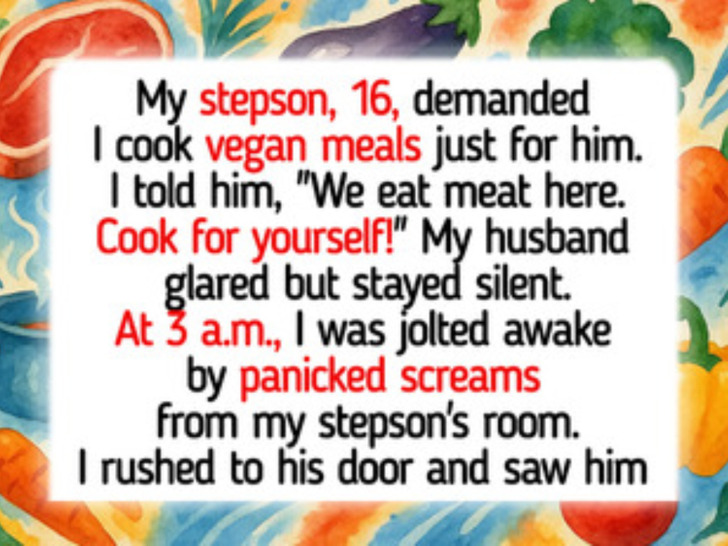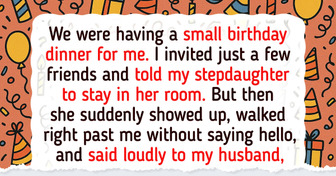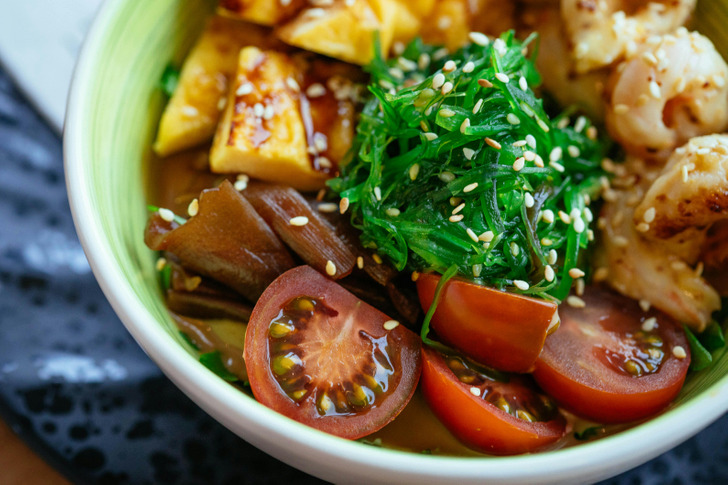If the shoe was on the other foot. Your child demanded that of your husband, would you have been okay with the response you gave to your stepson coming from your husband to your child.
To be honest, I felt your response was a little cold, and not very pleasant. Yes teenagers have peculiar behaviors and may sound demanding or disrespectful, but your response "we eat meat here". I found that distasteful, and disrespectful. It's hard enough as it is to get close to a child who isn't biologically yours, but that's just harsh. I think first off if he was demanding with his words or tone, I would have said something like, "I would appreciate a more calming tone when you speak to me, or if you would like something there is an appropriate way to ask". "When you speak to me in a more respectful tone, we can discuss meal options, until then, this is dinner".
I Refuse to Cook Vegan Meals for My Stepson, I’m Not His Personal Chef

It's only okay to refuse him a vegan meal if you refuse to fix anything that anyone else asks for. Nothing special for others if there's not anything special for your son. But I don't believe this story because the screams were coming from his bedroom and he had this mess in his bedroom. You're telling me a 16 year old boy doesn't know to cook in the kitchen? And even if he does decide to cook for himself he's not going to get up at 3:00 a.m. to do it. The story is bogus.
Please I cooked in middle of night all the time wen I was young
You'd actually be surprised how few teenager's know how to cook. Also kids are up at 3 am like always...have you ever been around kids before?
Well hate disappointment my 18 has awaken me with such ridiculous antics.
The young man is trying to make life choices for himself. At 16 he is a young adult and needs to know not everyone will be accomodating to what he prefers. He may have to sit out when his friends enjoy burgers or pizza and he chooses not to partake. He is at an age where he can start cooking for himself. He can search for recipes on the internet. He can start deciding what he likes and doesn't like. He shouldn't impose on everyone else because he is electing something very specific, that requires discipline, aside from it being limited in accessibility under most circumstances.
This young man needs to comprehend the technicalities of how he is wanting to live now and in the future. If a person has a set standard for his/her meals, that person can prepare it in ensuring all the boxes are met and if anything goes wrong, you have noone to blame but yourself.
He obviously was never taught how to cook. And you probably know that. I understand that you feel unappreciated because he doesn't want to eat the food you are cooking but if you look at him and see his decisions are based on not wanting to hurt animals instead of taking it personally is important. Many meals are already vegan or easily made vegan so taking a little time to show him would be easy and help build bonds and respect. Plus it's always nice to try new meals and more veggies is good for the entire family. I understand raising children can be challenging but also rewarding and can help us grow and learn at any age. Thank you for listening
A reader reached out about her 16-year-old stepson, who’s been insisting on vegan meals. Juggling teen moods, family rules, and mealtime chaos wasn’t easy, but here’s how she managed this tricky parenting challenge.
We received a letter from Ana.
My stepson, Dylan, 16, demanded I cook vegan meals just for him. I told him, “We eat meat in this house. Cook for yourself if you want vegan!” My husband gave me a sharp look but stayed silent.

I mean well, he is a big boy now anyway, no? He can COOK
At 3 a.m., I was jolted awake by panicked screams from Dylan’s room. My heart was racing as I ran in. Dylan was on the floor, frantically trying to make a “vegan meal” out of random things he’d taken from the fridge. Flour was spilled everywhere, jars were open, and the smell from the kitchen had taken over his room. He was frustrated, crying, and muttering, “I just wanted one meal... just one!”
At first, I didn’t say a word. I just helped him clean up and calmly reminded him, “This isn’t my job. You can eat vegan, but you have to cook for yourself.” Slowly, he calmed down, realizing the fight wasn’t worth it.
The next day, we sat down together and planned a few meals that worked for both of us. We’re still figuring it out, but Dylan seems less demanding. Even my husband admitted that a few of the vegan dishes turned out surprisingly good!
I’m still working on balancing firm house rules with understanding his needs, but at least the 3 a.m. screaming is behind us.
Do you think I handled this okay? Any advice would be really appreciated.
Best wishes,
— Ana
Our readers rushed to share their opinions.

Mom you got played. Royally played. I'm sure you had vegetables in that house that he could have taken and cooked instead of having a temper tantrum meltdown like a 2 year old. He needs to learn how to State his Desires in an intelligent manner like a real young man. His dad needs to talk to him. Sucker! I can't help it
Hi Ana, thank you for your honest letter. From the way you described it, we can tell how stressful that 3 a.m. moment must have been. Still, you kept your cool and managed to balance firm house rules with compassion. We know it is not easy when raising teens, let alone in step-parenting.
Saying, “You can eat vegan, but you have to cook for yourself,” was fair, and helping him clean up afterward showed you weren’t shutting him out.
We think you did the right thing. Drawing the line around food is important, but so is letting Dylan feel heard. The fact that you sat down together to plan meals shows real teamwork. Our advice is to let him take responsibility for his choices and treat shared meals as a way to connect rather than fight. Parenting teens is always a challenge, but the way you handled this shows a lot of patience and strength.
What do you think about this matter? Share your opinion in the comments section. And before you go, be sure to check out our next article on 11 phrases that can weaken your relationships. From casual comments to seemingly harmless remarks, these words can create tension and misunderstandings over time. Learning to avoid them can help strengthen communication and keep your connections healthy.
Comments
Laughable BS. 3am? Really? What a contrived pice of crap.
Where was Dad when the "3am screaming " was going on?
Sorry step mom, but your initial response was rather harsh.
It's gonna be fine, trust me
Related Reads
I Refused to Let My Food Be Stolen at Work, But I Think I Crossed a Line

I Bought My Grandson New Clothes—My DIL Humiliated Me

I Excluded My Stepdaughter From My Birthday Dinner and It Changed Everything

My DIL Disrespected Me in Front of Everyone, and My Son’s Response Broke My Heart

10 Stories That Are So Strange, Even Grandma Wouldn’t Believe Them

I Refused to Cover for My Coworker While She Took Her Miscarriage Leave

My Mom Overstepped Every Babysitting Limit—The Camera Footage Left Me Speechless

I Refuse to Let My MIL Watch Me and My Baby 24/7, Her Behavior Sickens Me

I Dropped Everything to See My Grandson — My DIL Kicked Me Out Like I Was Nobody

12 Wealthy People Who Kept Their Darkest Secrets Behind Closed Doors

I Refuse to Lose My House Just So That My Stepson Can Continue His Education

12 Simple Things Women Said That Left Men Forever Changed


